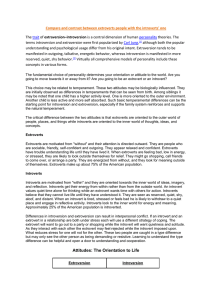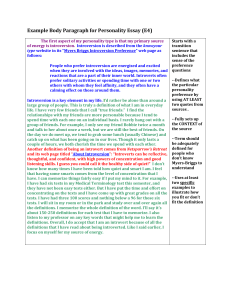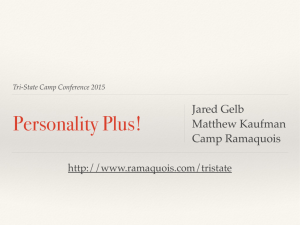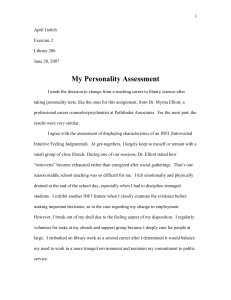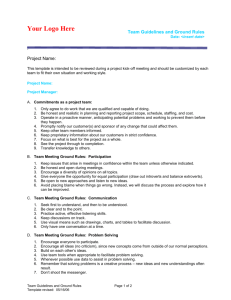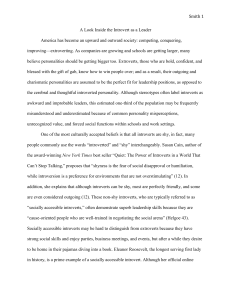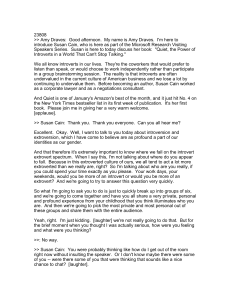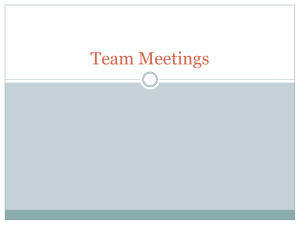Understanding Introversion as a Personality Trait
advertisement
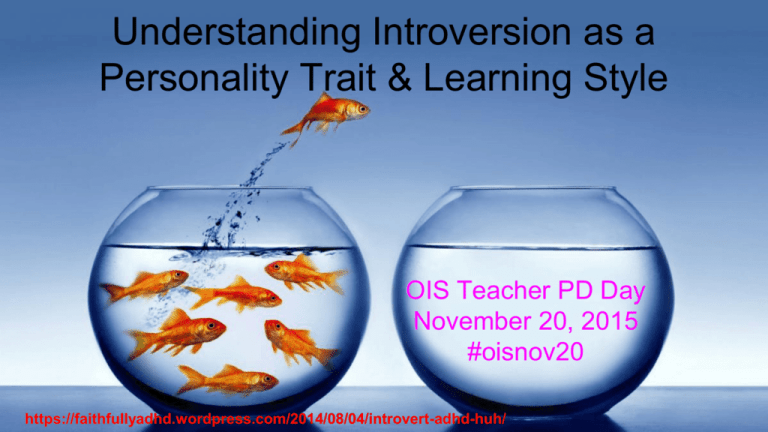
Understanding Introversion as a Personality Trait & Learning Style OIS Teacher PD Day November 20, 2015 #oisnov20 https://faithfullyadhd.wordpress.com/2014/08/04/introvert-adhd-huh/ Session Content Introduction There will be a test! What is introversion? (And what is it not?) What makes us introverted/extroverted?...research How do introverts experience our schools? Discussion/Q & A Time for Self-Evaluation 30 questions: 20 from “Quiet” & 10 from Kiersey Choose the answer that applies to you more often than not Determine your score: “Quiet”: Add up “T” & “F” responses Kiersey: Add up “A” & “B” responses Where do you fall out of a total of 30? (T & B = introverted) With a table-mate, Share your overall score. Discuss 2-3 questions which accurately describe your nature. Discuss 1-2 answers which were surprising. There is no such thing as a pure extrovert or pure introvert. Such a man would be in the lunatic asylum. Carl Jung We all exist on a spectrum, as indicated by your scores https://commons.wikimedia.org/wiki/File:ExtrovertIntrovertSpectrum.png What is Introversion NOT? LOTS and LOTS of misconceptions! Shy Aloof Cold Loner Hermit Anti-social Unfriendly Dislikes people Depressed http://barbaralayla.blogspot.com/2010/07/misunderstanding-introverts-part-one.html Other examples... WHO: Introversion is a potential health problem. APA: Introversion is a contributing factor to some personality disorders. http://disjointedthinking.jeffhughes.ca/2012/03/safe-spaces-for-solitude/ Introversion is now somewhere between a disappointment and a pathology. Susan Cain ⅓ to ½ of the human population is thought to be introverted. A minority in the regular population,but a majority in the gifted population. Jill Burruss & Lisa Kaenzig http://advertisementfeature.cnn.com/think-brilliant/the-surprising-power-of-introverts.html http://advertisementfeature.cnn.com/think-brilliant/the-surprising-power-of-introverts.html http://cdn.quotesgram.com/img/77/83/1311001446-Introverted_20Thinkers.jpg What is Introversion? Jung (1921): introverts are drawn to the inner world of thought and feeling; social interactions are taxing, so they need time alone to recharge. Influence of popular psychology: introversion and extroversion now are typically defined by how outgoing or shy we are. And remember the spectrum... http://quotesgram.com/extrovert-vs-introvert-quotes/#Y2P5zHrE07 For introverts, to be alone with our thoughts is as restorative as sleeping, as nourishing as eating. Jonathan Rauch Most people in politics draw energy from backslapping and shaking hands and all that. I draw energy from discussing ideas. Al Gore How do we become introverts (or extroverts)? Nature vs. Nurture: How much do we inherit, how much comes from experience? Temperament (foundation) vs. Personality (building); Not an either/or proposition Twin studies: Personality traits are 40 - 50% heritable. How do we become introverts (or extroverts)? Studies show that introvert brains are different from extrovert brains… Hans Eysenck: Levels of cortical arousal (speed & amount of brain activity) Introverts have higher levels; overwhelmed in highly stimulating situations Extroverts have lower levels; seek out stimulating situations RAS regulates arousal operates at a high base level for introverts PET scans show blood flow to different areas of introvert and extrovert brains I: areas associated with constructing meaning (inward focus) E: areas associated with engaging with outside stimuli (outward focus) http://advertisementfeature.cnn.com/think-brilliant/the-surprising-power-of-introverts.html How do we become introverts (or extroverts)? Studies show that introvert brains are different from extrovert brains… Dopamine study: Processing of rewards More active dopamine pathways in E brains; reinforces reward-seeking behavior I brains “buzz” less, so they don’t go as far to seek out rewards Ritalin study: Internal vs. external cues for reward and motivation Extroverts attributed pleasure to videos rather than the drug Introverts were no longer excited by the videos...internal Gambling study: I & E brains scanned while gambling Es who won at gambling experienced more pleasure; took more risks How do we become introverts (or extroverts)? Jerome Kagan: longitudinal study on reaction to novel stimuli, infancy - age 11 Results: 20% of 4-month-olds were “high-reactive”; 40% “low-reactive” Which were more likely to become introverts? Role of amygdala as brain’s “electrical switchboard” High-reactives are more likely to become introverts, wary of new stimuli Measurement of high-reactives’ eye movements - “alert attention” Carl Schwartz: Used fMRI scans on Kagan subjects to look inside their brains Kagan’s high-reactives tended to react more strongly to photos Evidence that temperament continues to influence us; but other factors shape our personalities Rubber-band theory: personality elasticity exists, but is limited Neither E=mc2 nor Paradise Lost was dashed off by a party animal. Winifred Gallagher http://www.constructivegrumpiness.com/wp-content/uploads/2014/05/introvert-infographic-famous.jpg A mind forever Voyaging through strange seas of Thought alone. William Wordsworth (describing Isaac Newton) Scientists can easily report on the behavior of extroverts, who can often be found laughing, talking, or gesticulating. But if a person is standing in a corner of a room, you can attribute about 15 motivations to that person. But you dont really know what’s going on inside. Elaine Aron 70% of today’s employees work in an open office plans. Some people are more certain of everything than I am of anything. Robert Rubin What does this mean for our students? http://www.edweek.org/ew/articles/2012/05/23/32introvert_ep.h31.html What an extroverted act it is in the first place to go to school. All day long, you are in a classroom full of people with constant stimulation. Susan Cain The squeaky wheel gets the grease. Unknown Many schools are designed for extroverts Think about how introverted kids experience a day at school: • • • • Large group instruction in classes of 20 and more Emphasis on teamwork instead of independent work Focus on group discussions, social gregariousness High levels of noise and activity Do we: • • • • • Provide opportunities to work both in groups and individually? Allow time for thinking before responding? Have spaces where kids can recharge? Create opportunities for students to practice skills that terrify introverts? Let a preference for extroverted traits influence our assessment of students? Secondary School Student Development Report Motivation for learning • Actively engages in learning through listening, speaking, reading and writing. • Works independently. • Perseveres when problem solving by using a variety of different methods and questioning techniques to reach a solution. • Takes initiative in class and is proactive when working on assignments. Social Responsibility • Makes informed decisions and displays ethical behavior. • Takes responsibility for self and is accountable for own actions. • Is socially conscious and mindful of others. Social / Emotional Intelligence • Is empathetic, open-minded and actively listens to others. • Is a risk taker, challenges self to creative problem-solving, and explains thinking processes and solutions. • Collaborates well with peers and works effectively and efficiently in a team environment. • Allows others to share thoughts and is considerate of various perspectives. Personal Management • Comes prepared to learn with all required materials. • Punctual to class, manages time effectively during the lesson and meets deadlines. • Is ready and willing to learn and asks for support when necessary. http://ideas.ted.com/how-to-teach-a-young-introvert/ Practical suggestions that could benefit introverts • Mix up approaches the both Is & Es favor: lectures, downtime, independent projects (I); movement, stimulation, collaborative work (E). • Wait-time is HUGE! Write out answers to questions posed in class, perhaps. • Be aware that introverts will have 1-2 deep interests that might them appear freaky & invite teasing. Praise, encourage, help them find others like them. • Use pairs and 3s for collaborative work; keep things structured by assigning clearly defined roles. • Independent work will help extroverts, too (mastery)! • Don’t force participation; make it easy, create a safe environment instead. Several studies show that extroverts get better grades than introverts during elementary school, but introverts outperform extroverts in high school & college. One study tested 141 college students’ knowledge of 20 different subjects, from art to astronomy to statistics, and found that introverts knew more than the extroverts about every single one of them. At the university level, introversion predicts academic performance better than cognitive ability. Sources Cain, Susan. "Must Great Leaders Be Gregarious?" The New York Times. The New York Times, 15 Sept. 2012. Web. 5 Nov. 2015. <http://www.nytimes.com/2012/09/16/opinion/sunday/introverts-make-great-leaders-too.html?_r=1>. Cain, Susan. Quiet: The Power of Introverts in a World That Can't Stop Talking. New York: Crown, 2012. Print. "Personality Test - Keirsey.com *** Keirsey Temperament Sorter II." Personality Test - Keirsey.com *** Keirsey Temperament Sorter II. Web. 3 Nov. 2015. Rauch, Jonathan. "Caring for Your Introvert." The Atlantic. Atlantic Media Company, 1 Mar. 2003. Web. 24 Oct. 2015. <http://www.theatlantic.com/magazine/archive/2003/03/caring-for-your-introvert/302696/>. Dodd, Scott. "Is President Obama’s Personality Type To Blame for His Disastrous Debate Performance?" Slate Magazine. 5 Oct. 2012. Web. 3 Nov. 2015. <http://www.slate.com/articles/health_and_science/science/2012/10/obama_s_denver_debate_performance_introverted_personalities _are_misunderstood_.html>. Sources "How to Teach a Young Introvert." Ideastedcom. 2 Sept. 2014. Web. 19 Nov. 2015. <http://ideas.ted.com/how-to-teach-a-youngintrovert/>. "Studies Illustrate Plight of Introverted Students." Education Week. Web. 19 Nov. 2015. <http://www.edweek.org/ew/articles/2012/05/23/32introvert_ep.h31.html>. "The Science of What Makes an Introvert and an Extrovert." Io9. Web. 20 Nov. 2015. <http://io9.com/the-science-behind-extroversionand-introversion-1282059791>. "Are You An Introvert Or An Extrovert? What It Means For Your Career." Fast Company. 21 Aug. 2013. Web. 15 Nov. 2015. <http://www.fastcompany.com/3016031/leadership-now/are-you-an-introvert-or-an-extrovert-and-what-it-means-for-your-career>.
